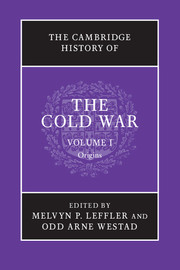Book contents
- Frontmatter
- 1 The Cold War and the international history of the twentieth century
- 2 Ideology and the origins of the Cold War, 1917–1962
- 3 The world economy and the Cold War in the middle of the twentieth century
- 4 The emergence of an American grand strategy, 1945–1952
- 5 The Soviet Union and the world, 1944–1953
- 6 Britain and the Cold War, 1945–1955
- 7 The division of Germany, 1945–1949
- 8 The Marshall Plan and the creation of the West
- 9 The Sovietization of Eastern Europe, 1944–1953
- 10 The Cold War in the Balkans, 1945–1956
- 11 The birth of the People’s Republic of China and the road to the Korean War
- 12 Japan, the United States, and the Cold War, 1945–1960
- 13 The Korean War
- 14 US national security policy from Eisenhower to Kennedy
- 15 Soviet foreign policy, 1953–1962
- 16 East Central Europe, 1953–1956
- 17 The Sino-Soviet alliance and the Cold War in Asia, 1954–1962
- 18 Nuclear weapons and the escalation of the Cold War, 1945–1962
- 19 Culture and the Cold War in Europe
- 20 Cold War mobilization and domestic politics: the United States
- 21 Cold War mobilisation and domestic politics: the Soviet Union
- 22 Decolonization, the global South, and the Cold War, 1919–1962
- 23 Oil, resources, and the Cold War, 1945–1962
- Bibliographical essay
- Index
- References
22 - Decolonization, the global South, and the Cold War, 1919–1962
Published online by Cambridge University Press: 28 September 2010
- Frontmatter
- 1 The Cold War and the international history of the twentieth century
- 2 Ideology and the origins of the Cold War, 1917–1962
- 3 The world economy and the Cold War in the middle of the twentieth century
- 4 The emergence of an American grand strategy, 1945–1952
- 5 The Soviet Union and the world, 1944–1953
- 6 Britain and the Cold War, 1945–1955
- 7 The division of Germany, 1945–1949
- 8 The Marshall Plan and the creation of the West
- 9 The Sovietization of Eastern Europe, 1944–1953
- 10 The Cold War in the Balkans, 1945–1956
- 11 The birth of the People’s Republic of China and the road to the Korean War
- 12 Japan, the United States, and the Cold War, 1945–1960
- 13 The Korean War
- 14 US national security policy from Eisenhower to Kennedy
- 15 Soviet foreign policy, 1953–1962
- 16 East Central Europe, 1953–1956
- 17 The Sino-Soviet alliance and the Cold War in Asia, 1954–1962
- 18 Nuclear weapons and the escalation of the Cold War, 1945–1962
- 19 Culture and the Cold War in Europe
- 20 Cold War mobilization and domestic politics: the United States
- 21 Cold War mobilisation and domestic politics: the Soviet Union
- 22 Decolonization, the global South, and the Cold War, 1919–1962
- 23 Oil, resources, and the Cold War, 1945–1962
- Bibliographical essay
- Index
- References
Summary
In 1900, most of Asia, Africa, the Caribbean, and the Middle East were ruled directly or indirectly by the Euro-American colonial powers. As late as the outbreak of World War II, almost a billion of the world’s people lived under direct colonial rule. But in the two decades after 1945 imperial order collapsed. At times peacefully, but often after protracted warfare and violence, the imperial powers eventually ceded independence to most of South and Southeast Asia and the Middle East by the mid-1950s. Independence movements ruptured much of the rest of the imperial world over the next decade. In Africa, the year 1960 alone brought independence to seventeen former colonies. Ten more African states would gain their independence over the next several years, as would former colonies in the Caribbean and Latin America. One dramatic measure of the rapidity and scope of this shift in the constitution of world political order was the enlargement of the United Nations. At its founding in 1945, the UN included 51 member states. In 1965, the number had more than doubled to 117, with a majority of the increase made up of states in the global South that formerly had been colonies.
Making sense of these complex events and processes — which crossed time, space, and cultures and were just as much highly contingent and local as they were part of larger shifts in global power and sensibilities — has presented conceptual difficulties for historians. The very terms by which to analyze the phenomena of decolonization have been unusually vexed. For historians of Euro-American empire, decolonization marks the final chapter of high imperialism. It is often viewed through the lens of actors in the metropole and colonial administrators on the ground, emphasizing the ways they shaped both the timing and the trajectories of independence. Historians of Africa, Asia, the Middle East, and Latin America, more concerned with the experiences of the colonized than the colonizers, have argued that such a narrative risks reinscribing patterns of Western imperial power and denies agency to local actors. In this view, independence was not so much given as taken, and anticolonial actors and their construction of postcolonial states and society become central elements of the story. More recently, the meanings of empire and its dissolution have been seen as overlapping and intertwined processes in which the historical experiences of metropole and colony, albeit under considerable differentials of power, mutually constituted one another.
- Type
- Chapter
- Information
- The Cambridge History of the Cold War , pp. 464 - 485Publisher: Cambridge University PressPrint publication year: 2010
References
- 17
- Cited by



